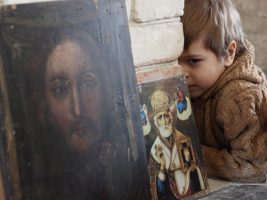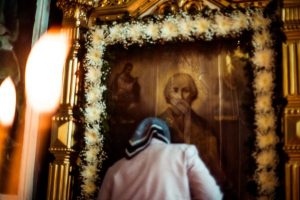The Sunday after Pentecost commemorates all the Saints of Church, and reminds us that the great legacy of Pentecost is that all of us who have received the gift of the Holy Spirit—knowing Him, relating to Him—are saints in utero, waiting to be born.
Saint Paul, writing to the Corinthians, begins his first Epistle by saying, To the church of God which is at Corinth, to those sanctified in Christ Jesus, called to be saints together with all those who in every place call on the name of our Lord Jesus Christ, both their Lord and ours. How do we live as the saints we are called to become? On the one hand, that God is Himself forming us to be His ‘holy ones.’ Like the unborn child who is fed by his mother with oxygen and nutrients through the umbilical cord, we are fed on the life-giving and sustaining Spirit of God in the Church. As long as we are immersed in the womb of holy tradition and attached to the source of our heavenly food—the Eucharist—the Lord Himself gives us everything we need to grow into His children, belonging to Him, breathing His breath, embodying His image and likeness to the world.
Unlike the fetus in the womb, though, we have a responsibility, because we have the power to wilfully cut the lifeline that feeds us on the Spirit, and abort ourselves from the matrix that is sanctifying and perfecting us to become God’s holy children. Becoming saints means being actively faithful to the new life and identity that God has conceived within us. Faith, indeed, is the primary characteristic of the saints. As the Wisdom of Solomon says, Those who trust in him will understand truth, and the faithful will abide with him in love, because grace and mercy are upon his elect, and he watches over his holy ones. And the Epistle to the Hebrews tells us of the Old Testament righteous ones who accomplished great deeds and endured much suffering by faith.
How do we live by faith to become saints? Contrary to popular belief, faith is not reserved for a spiritually-inclined elite with a superhuman ability to resist the bullets of logic, and leap vast chasms of the unknown in a single bound. According to the Scriptures, faith has always been understood as trust that God will do what He has always said He will do—as the Apostle says, the assurance of things hoped for. And what is hoped for except that God will fulfill His promise to one day enter into the midst of His people and be united with them forever? This is why Jesus is called the pioneer and perfecter of our faith—because he fulfills the trust concerning the promise of the Incarnation, which the Old Testament righteous never saw. Faith, then, is ultimately a gift from God—He leaps the chasm between the divine to the human, not the other way around. We do not discover Him; He reveals Himself to all who are willing to receive Him.
Living by faith, then, is the persistent willingness to receive the gift of God Himself in Jesus Christ. I have heard it said that trying to pray is the same thing as praying. I would add today that being willing to live by faith is the same thing as living by faith. I would therefore like to speak about two principles of willingness to live by faith. You have heard these before many times, but the truth be told, this has always been my one and only message. I repeat them now as axioms of the spiritual life to which we must hold if we are truly going to fulfil our potential, growing into God’s holy ones so that we might be born into the family of Saints His Kingdom.
The first principle of being willing to live by faith is this: be honest. We cannot embrace universal Reality of what God has done for people in Jesus Christ until we take the first step to acknowledge that Reality exists in the first place. I was reminded of the wicked queen and the magic mirror. As you may recall, the whole story was set in motion when the wicked queen went to this mirror and said, “Mirror, mirror, on the wall, who is the fairest one of all?” She asked the question, not because she really wanted to know, but expecting to be told that she was the fairest one of all. When the mirror answered, “You, my queen, are fair; it is true. / But Snow White is even fairer than you,” the queen flew into a jealous and sought to kill the beautiful princess.
Each of us has one of those mirrors hanging in the inner chambers of our hearts. Its voice is the voice of the Holy Spirit, the still small voice of God, telling us who we truly and who we were meant to be. Too often, though, we suffer the torment of the wicked queen because we cannot relinquish the image we have conjured up for ourselves. We want to be the fairest one of all, absolved of the need to repent; or perversely, we want to be the foulest one of all, beyond all hope of redemption and free from all responsibility. Our problem is, the mirror won’t cooperate to show us what we think we ought to see! And so, we are caught up in a turmoil of anger, envy, jealousy, anxiety—all of which inexorably rob us of the true identity God offers us. And what is that identity? Simply, what the mirror is really telling us: that we are neither the fairest (above all) nor the foulest (beyond all hope). Rather, we are fair, which is to say, we are ordinary creatures, made good but always dependent on the grace and mercy of the One who truly is the fairest of the sons of men.
Having taken this step towards the willingness to live by faith, we then need to strive to live by the second principle: be teachable. Before I was a priest, I was trained as a high school teacher. At the beginning of every school year, I made a point of telling my students the same thing: success in my class does not depend on intelligence. All you need to do to succeed is to show up regularly and on time, do the work and ask for help. On that basis alone, even the least intelligent student could achieve a satisfactory mark and move on from there.
What is true about the classroom is true of life in the Church, where we are learning to be saints. What we need to make more saints in the Church are not more spiritual Elders or monasteries or PhDs in theology. We need more teachable people. We need people who show up regularly and on time, not just because it makes us feel spiritual or because we feel guilty if we don’t, but because showing up is what you do if you want to be taught. We need people who are willing to do whatever is required, however mundane or simple, not because we are trying to fulfill some grand vision of the Lord or because we feel obligated, but doing what is required is what you do if you want to be taught. We need people who are not afraid to ask for help, to seek guidance and make efforts to follow the guidance when it is given, not because we are looking for a rubber stamp to our own agendas or because we are caught in some codependent trap, but simply because asking for help is what you do if you want to be taught. We don’t need more intelligent people or more “spiritual” people. We need teachable people; we need to be teachable people if we want to cultivate within ourselves a willingness to live by faith, and therefore grow into the saints of North America.
Be honest—look in the mirror of truth and listen to the voice of the Spirit. Be teachable—by showing up, doing what is necessary, and asking for help. These are the steps towards opening our hearts and minds so that day by day, week by week, month by month, God can continue to nourish us in the womb of His Virgin Bride, shaping us into the measure and stature of Christ, so that beginning in this age and continuing into the age to come, we may emerge fully formed and perfect—holy ones, divine sons and daughters, Saints in whom God is truly wonderful.
Fr. Richard Rene is a priest in the Orthodox Church of America, a professional writer and has published a number of poetry, short stories and novels. He also has a podcast on Ancient Faith Radio and posts regular sermons and reflections on his blog Mysterion.




















